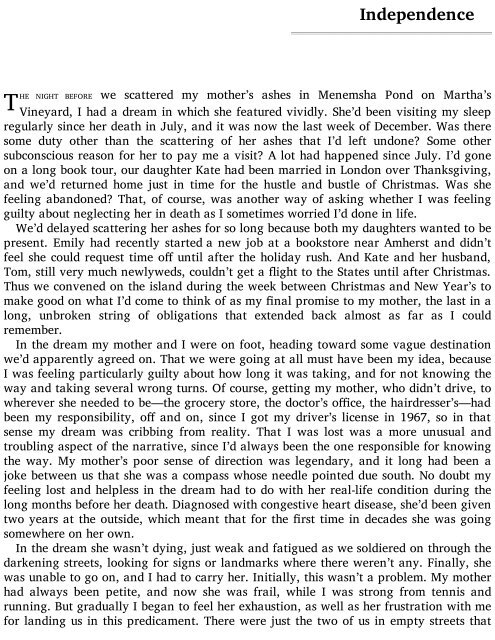8956825209375
Create successful ePaper yourself
Turn your PDF publications into a flip-book with our unique Google optimized e-Paper software.
Independence<br />
T<br />
HE NIGHT BEFORE we scattered my mother’s ashes in Menemsha Pond on Martha’s<br />
Vineyard, I had a dream in which she featured vividly. She’d been visiting my sleep<br />
regularly since her death in July, and it was now the last week of December. Was there<br />
some duty other than the scattering of her ashes that I’d left undone? Some other<br />
subconscious reason for her to pay me a visit? A lot had happened since July. I’d gone<br />
on a long book tour, our daughter Kate had been married in London over Thanksgiving,<br />
and we’d returned home just in time for the hustle and bustle of Christmas. Was she<br />
feeling abandoned? That, of course, was another way of asking whether I was feeling<br />
guilty about neglecting her in death as I sometimes worried I’d done in life.<br />
We’d delayed scattering her ashes for so long because both my daughters wanted to be<br />
present. Emily had recently started a new job at a bookstore near Amherst and didn’t<br />
feel she could request time o until after the holiday rush. And Kate and her husband,<br />
Tom, still very much newlyweds, couldn’t get a ight to the States until after Christmas.<br />
Thus we convened on the island during the week between Christmas and New Year’s to<br />
make good on what I’d come to think of as my nal promise to my mother, the last in a<br />
long, unbroken string of obligations that extended back almost as far as I could<br />
remember.<br />
In the dream my mother and I were on foot, heading toward some vague destination<br />
we’d apparently agreed on. That we were going at all must have been my idea, because<br />
I was feeling particularly guilty about how long it was taking, and for not knowing the<br />
way and taking several wrong turns. Of course, getting my mother, who didn’t drive, to<br />
wherever she needed to be—the grocery store, the doctor’s oce, the hairdresser’s—had<br />
been my responsibility, o and on, since I got my driver’s license in 1967, so in that<br />
sense my dream was cribbing from reality. That I was lost was a more unusual and<br />
troubling aspect of the narrative, since I’d always been the one responsible for knowing<br />
the way. My mother’s poor sense of direction was legendary, and it long had been a<br />
joke between us that she was a compass whose needle pointed due south. No doubt my<br />
feeling lost and helpless in the dream had to do with her real-life condition during the<br />
long months before her death. Diagnosed with congestive heart disease, she’d been given<br />
two years at the outside, which meant that for the rst time in decades she was going<br />
somewhere on her own.<br />
In the dream she wasn’t dying, just weak and fatigued as we soldiered on through the<br />
darkening streets, looking for signs or landmarks where there weren’t any. Finally, she<br />
was unable to go on, and I had to carry her. Initially, this wasn’t a problem. My mother<br />
had always been petite, and now she was frail, while I was strong from tennis and<br />
running. But gradually I began to feel her exhaustion, as well as her frustration with me<br />
for landing us in this predicament. There were just the two of us in empty streets that

















